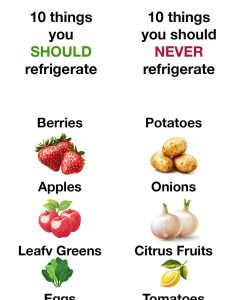Proper food storage is essential to keeping our meals safe, nutritious, and flavorful. In the typical American kitchen, where there’s a wide range of items from fresh produce to dairy and meats, understanding what should go in the fridge and what should not can be confusing. But knowing how to store your groceries correctly not only helps preserve their quality but also minimizes waste, saves money, and enhances your overall eating experience.

Refrigeration plays a critical role in slowing the growth of bacteria and mold, both of which can spoil food and cause illness. Lower temperatures help extend shelf life, preserve flavor, and protect the nutrients in many of the foods we enjoy. However, not every item benefits from being chilled. In some cases, refrigeration can actually damage the texture or taste of certain foods. That’s why it’s important to understand which items should always be refrigerated—and which ones should never be.
Let’s start with ten items that should always be kept in the refrigerator. First on the list: berries. Strawberries, blueberries, raspberries, and other berries are highly perishable and prone to mold. When stored in the refrigerator in a breathable container, their shelf life can be extended, and their freshness better preserved. Next, apples—though they can be stored on the counter for a short time, refrigerating them helps maintain their crispness and extends their life. It’s best to keep them in the crisper drawer.
Leafy greens like spinach, lettuce, and kale wilt quickly and lose nutrients when left out. Storing them in the fridge, ideally in a container or bag with a paper towel to absorb excess moisture, helps keep them vibrant and nutritious. Dairy products are especially vulnerable to spoilage. Milk, cheese, and yogurt should always be refrigerated to prevent bacterial growth and maintain their safety and flavor. Eggs also belong in the refrigerator. Cold storage reduces the risk of Salmonella and extends freshness.
Cooked meats such as chicken, pork, and beef should be stored in airtight containers in the fridge to prevent spoilage and retain their flavor and moisture. Leftovers, too, need refrigeration within two hours of being cooked to minimize bacterial risk. Using airtight containers can help reduce waste and keep meals tasty for later. Herbs like parsley and cilantro, while delicate, stay fresher longer when stored upright in a glass of water and covered loosely with plastic. Condiments like ketchup, mayonnaise, and salad dressings also belong in the fridge once opened to prevent spoilage. Finally, fresh juices—especially those that are homemade—should be stored in airtight containers in the refrigerator to preserve nutrients and avoid fermentation.
Now let’s look at foods you should never refrigerate. Starting with potatoes—refrigeration turns their starches into sugars, causing a gritty texture and overly sweet taste. Store them in a cool, dark area instead. Onions also don’t do well in the fridge. The moisture can lead to softening and mold growth. A ventilated pantry space is a better option, and keeping them separate from potatoes helps prevent sprouting. Citrus fruits, such as lemons, limes, and oranges, can become dull and lose their juice when refrigerated. Leave them at room temperature for best results.
Tomatoes are another food that suffers in the cold. Refrigeration affects their flavor and makes the texture mealy. Instead, keep them on the counter so they can ripen properly. Bread might seem like a good candidate for the fridge, but cold temperatures actually dry it out faster. A bread box or a cool, dry spot keeps it fresh without turning it stale. Honey is naturally long-lasting and doesn’t require refrigeration. In fact, cold storage causes it to crystallize and harden, making it less pleasant to use.
Coffee, whether in bean or ground form, should be kept in a cool, dark place—not the refrigerator. The fridge introduces moisture and odors that can compromise the taste. Garlic, another pantry staple, can become rubbery and sprout when chilled. Keep it dry, well-ventilated, and away from sunlight. Bananas don’t benefit from refrigeration either. Cold disrupts their ripening and causes the skin to brown, even though the inside may still be unripe. Let them ripen at room temperature for the best flavor. Avocados are similar. Until they ripen, they should be kept on the counter. Refrigerating unripe avocados can make them tough and delay ripening.
Understanding how to store each type of food properly is one of the best ways to make the most of your groceries. Not only does it preserve quality and prevent spoilage, but it also ensures your meals are as nutritious and delicious as possible. By recognizing which foods thrive in the fridge and which ones do better on the counter, you can cut down on food waste and stretch your grocery budget further. It’s all about knowing your food and giving it the right environment to stay fresh. With just a few mindful habits, you’ll keep your kitchen stocked with food that tastes better and lasts longer.





